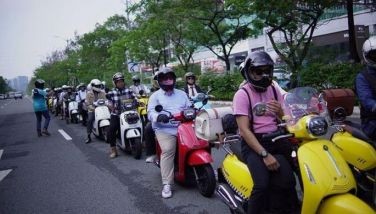Court stops controversial GMA order
February 12, 2003 | 12:00am
The Olongapo Regional Trial Court stopped the government from implementing the controversial Executive Order 142 of President Arroyo that virtually makes life harder for owners of imported vehicles.
In a five-page decision, Olongapo RTC Branch 72 Judge Eleodoro Ubiadas said EO 142 conflicts with the provision of the Tariff and Customs Code that says additional duties and taxes cannot be levied on any imported vehicle one year after the initially required fees have been settled.
He pointed out that fraud in the payment of the required taxes cannot be presumed by EO 142. "The presumption in law is that official duties were regularly performed by the concerned government officials," Ubiadas said.
EO 142 was issued by President Arroyo in November purportedly to correct deficiencies in the collection of taxes due from imported motor vehicles.
In the order, the President tasked the Bureau of Customs (BoC), the Bureau of Internal Revenue (BIR) and the Land Transportation Office (LTO) to create a one-stop shop where owners of imported vehicles registered from January 2000 to December 2002 can settle their unpaid obligations.
The President said imported vehicle owners should go to the one-stop shop with their customs papers which would be examined and assessed before they can be allowed to register or re-register their vehicles with the LTO. Should an error in the papers be established, the owners would not be allowed to renew their registration if they don’t to pay the corresponding fees and taxes determined by the one-stop shop. If they fail to pay within 10 days, the government can seize their vehicles.
The order was received with howls by importers, both big and small, especially those who are not part of the Car Development Program (CDP), an elite group composed by major car manufacturers.
These importers branded the order as discriminatory since it exempts vehicles imported by CDP members. The importers also decried the order as unconstitutional, something that violates their right to conduct legitimate business.
In response to the court’s order, Malacañang tasked Trade Secretary Mar Roxas to come up with a defense for EO 142.
Presidential spokesman Ignacio Bunye said Roxas should be the one to defend the EO since it was he who invoked the need to protect the local car industry by imposing a ban on imported used vehicles.
"The ban on these imported used vehicles is a policy of the government which is aimed at protecting the industry that is contributing to employment generation," Bunye said. "We will let Secretary Roxas defend this because he is the proponent of this policy."
Bunye refused to say, though, if the President would order a suspension of EO 142 in view of the court’s decision.
"We haven’t seen the court order. We’ll respond as soon as we get hold of a copy," he said. – With reports from Marichu Villanueva
In a five-page decision, Olongapo RTC Branch 72 Judge Eleodoro Ubiadas said EO 142 conflicts with the provision of the Tariff and Customs Code that says additional duties and taxes cannot be levied on any imported vehicle one year after the initially required fees have been settled.
He pointed out that fraud in the payment of the required taxes cannot be presumed by EO 142. "The presumption in law is that official duties were regularly performed by the concerned government officials," Ubiadas said.
EO 142 was issued by President Arroyo in November purportedly to correct deficiencies in the collection of taxes due from imported motor vehicles.
In the order, the President tasked the Bureau of Customs (BoC), the Bureau of Internal Revenue (BIR) and the Land Transportation Office (LTO) to create a one-stop shop where owners of imported vehicles registered from January 2000 to December 2002 can settle their unpaid obligations.
The President said imported vehicle owners should go to the one-stop shop with their customs papers which would be examined and assessed before they can be allowed to register or re-register their vehicles with the LTO. Should an error in the papers be established, the owners would not be allowed to renew their registration if they don’t to pay the corresponding fees and taxes determined by the one-stop shop. If they fail to pay within 10 days, the government can seize their vehicles.
The order was received with howls by importers, both big and small, especially those who are not part of the Car Development Program (CDP), an elite group composed by major car manufacturers.
These importers branded the order as discriminatory since it exempts vehicles imported by CDP members. The importers also decried the order as unconstitutional, something that violates their right to conduct legitimate business.
In response to the court’s order, Malacañang tasked Trade Secretary Mar Roxas to come up with a defense for EO 142.
Presidential spokesman Ignacio Bunye said Roxas should be the one to defend the EO since it was he who invoked the need to protect the local car industry by imposing a ban on imported used vehicles.
"The ban on these imported used vehicles is a policy of the government which is aimed at protecting the industry that is contributing to employment generation," Bunye said. "We will let Secretary Roxas defend this because he is the proponent of this policy."
Bunye refused to say, though, if the President would order a suspension of EO 142 in view of the court’s decision.
"We haven’t seen the court order. We’ll respond as soon as we get hold of a copy," he said. – With reports from Marichu Villanueva
BrandSpace Articles
<
>
- Latest
Latest
Latest
August 16, 2024 - 11:00am
By Euden Valdez | August 16, 2024 - 11:00am
June 18, 2024 - 2:55pm
June 18, 2024 - 2:55pm
Recommended





























